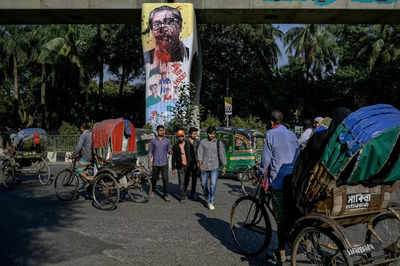The educational curriculum in Bangladesh is undergoing significant changes. The revised textbooks will attribute the declaration of independence in 1971 to Ziaur Rahman instead of ‘Bangabandhu‘ Sheikh Mujibur Rahman. They have also eliminated Mujib’s title as ‘Father of the Nation’.
“The new textbooks for the 2025 academic year will state that ‘on March 26, 1971, Ziaur Rahman declared the independence of Bangladesh, and on March 27, he made another declaration of independence on behalf of Bangabandhu’,” Prof AKM Reazul Hassan, chairman of the National Curriculum and Textbook Board, told The Daily Star.
The information has been included in the free textbooks where the matter of the declaration was mentioned, he added.
Ziaur Rahman established the Bangladesh Nationalist Party (BNP) and was married to current BNP leader Khaleda Zia. Sheikh Mujibur Rahman, who was the father of recently removed Bangladesh Prime Minister Sheikh Hasina, spearheaded the country’s liberation movement.
According to the report, writer and researcher Rakhal Raha, who was involved in the process of making changes in the textbooks, said they tried to free the textbooks from “exaggerated, imposed history”.
“Those who revised the textbooks found that it wasn’t fact-based information that Sheikh Mujibur Rahman sent the wireless message [declaring independence] while being arrested by the Pakistani army, and so they decided to remove it.”
Previously, the content in textbooks for grades one through 10 regarding the person who made the Declaration of Independence was altered based on whichever political party held power.
Awami League supporters strongly maintain that Mujibur Rahman issued the declaration, while Ziaur Rahman, then serving as an Army major and subsequent sector commander during the Liberation War, simply delivered the announcement following Mujib’s directives.
Previously, Bangladesh initiated steps to remove Sheikh Mujibur Rahman’s image from its currency notes during the phase-out of older notes.
This action followed the removal of his daughter Sheikh Hasina from her position as prime minister on August 5. As she sought refuge in India, Sheikh Mujibur Rahman’s statues and murals were vandalised.
Earlier, Bangladesh’s interim government, led by chief adviser Muhammad Yunus, decided to cancel eight National Days, including the March 7 and August 15 celebrations which are associated with the country’s Liberation War spearheaded by Sheikh Mujibur Rahman.
According to Awami League, the decision to cancel the March 7 national holiday, a date that marks Sheikh Mujib’s iconic speech that galvanised the people to fight for independence, was motivated by an ideological rejection of Mujib’s role in the nation’s founding. Similarly, the cancellation of August 15 as National Mourning Day is seen as an attempt to downplay the assassination of Bangabandhu and his family.
Who was Sheikh Mujibur Rahman
Sheikh Mujibur Rahman, referred as ‘Bangabandhu’, served as the inaugural president of independent Bangladesh. His life ended tragically when Bangladesh Army officers executed a coup, raiding his Dhanmondi 32 residence. This incident represented a crucial moment in Bangladesh’s political landscape, marking the military’s first direct interference in civilian governance. Sheikh Mujibur Rahman served in leadership roles as either president or prime minister from April 1971 until his assassination.
His Awami League party achieved overwhelming success in the 1970 general election of united Pakistan, securing virtually all seats in East Pakistan, which subsequently became Bangladesh. Initially serving as Bangladesh’s prime minister, he later established one-party rule and assumed the presidency in January 1975. On August 15, within his first year as president, soldiers assassinated Sheikh Mujibur Rahman alongside his wife and three sons.
In the ensuing period, commerce minister Khondaker Mostaq Ahmad took control, declaring himself interim government head from August 15, 1975, to November 6, 1975. Ahmad’s leadership proved short-lived. On November 3, army chief of staff Khaled Mosharraf led a successful coup against him. Subsequently, rival insurgents killed Mosharraf. After several successive coups and counter-coups, General Ziaur Rahman ultimately gained control on November 7.




